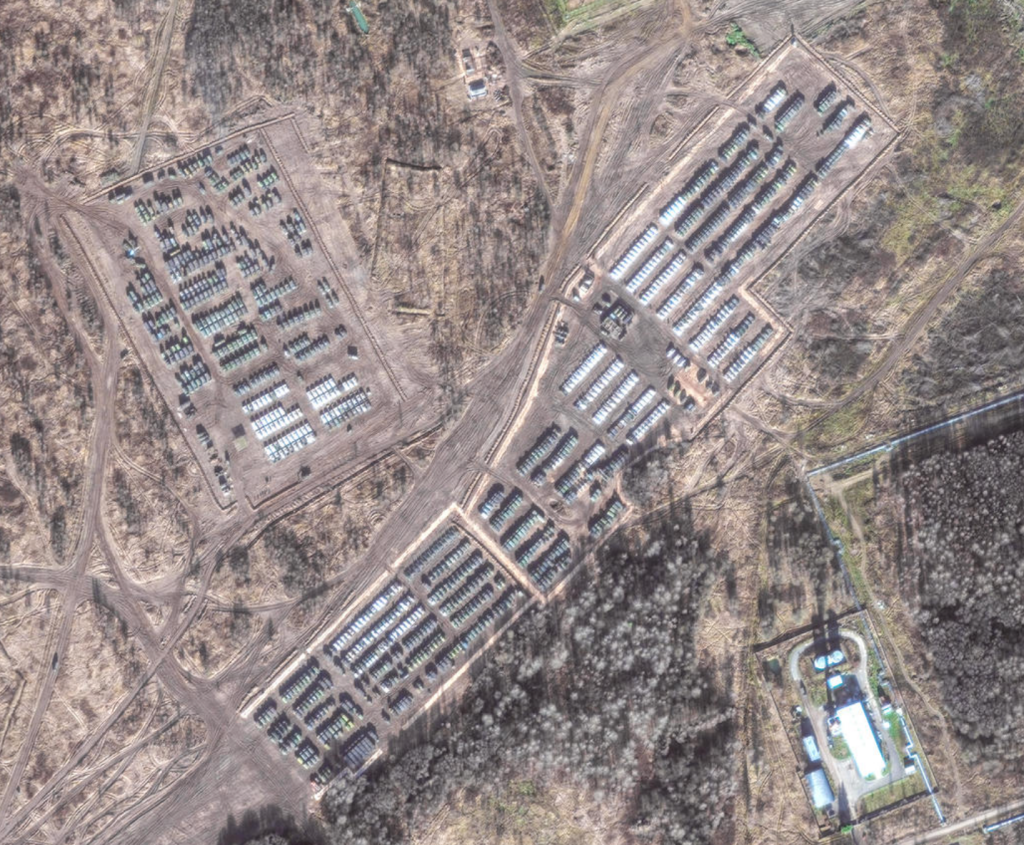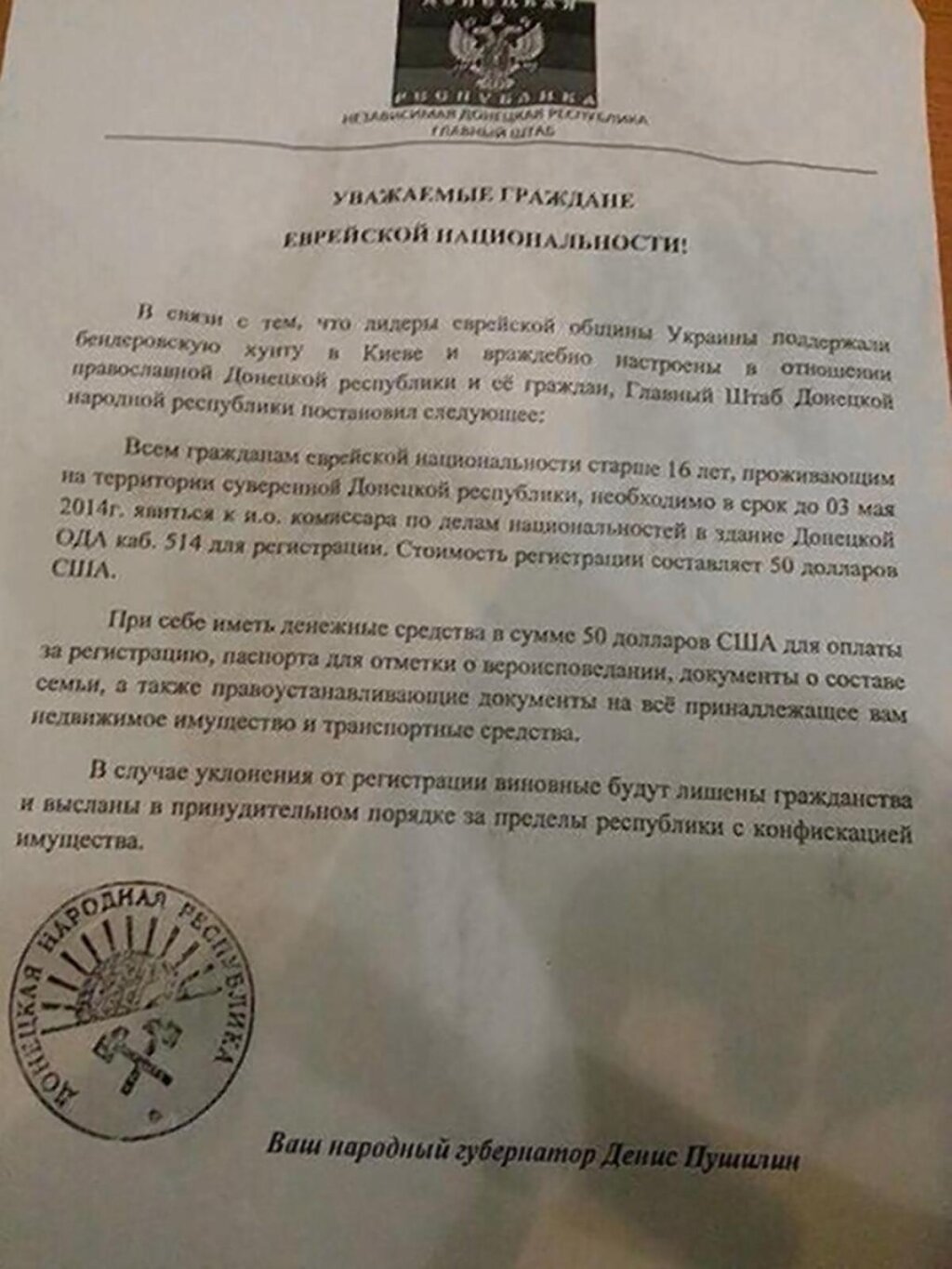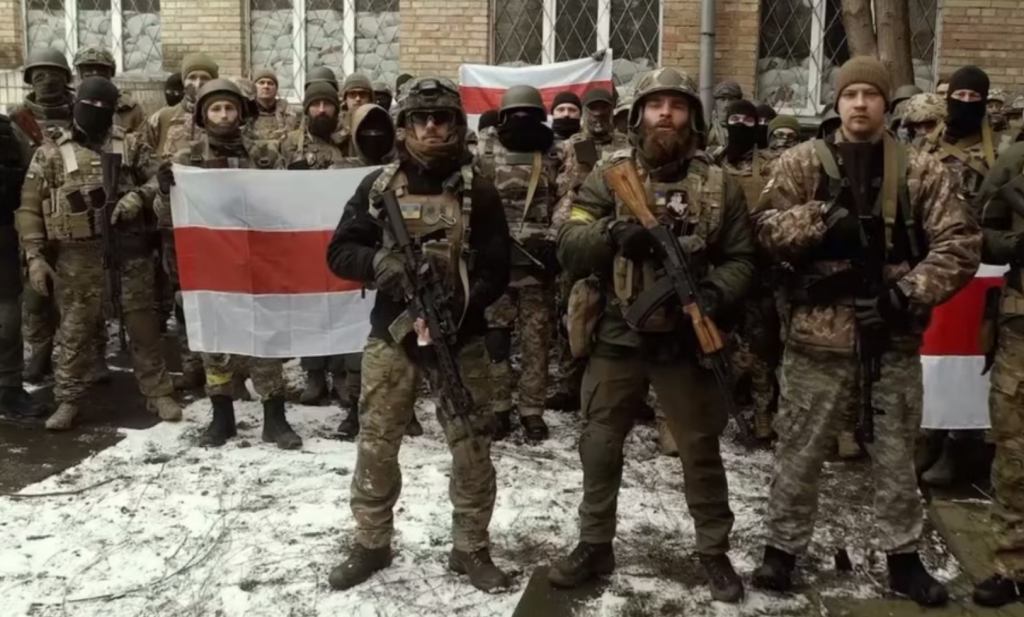Above: Satellite imagery showing Russian ground forces near the Ukrainian border in December 2021. Source: CBS News
Andrei P. Tsygankov is Professor of Political Science and International Relations at San Francisco State University. His new book, Russian Realism: Defending “Derzhava” in International Relations, is available from Routledge.
I am grateful for the opportunity to blog about my paper on Russia and global power transition. The paper reviewed Russian foreign policy discussions during the Trump era, but it has also included important implications for post-Trump developments. Below I briefly summarize the paper’s argument and extend it further to understand Russia’s goals and actions in the contemporary international system.
Russia’s goals and security initiatives
Russia remains both united and divided on the issue of international order and relations with Western powers. Members of the foreign policy community have frequently advocated revisionist actions to change the West-dominant system into one that is multipolar, multilateral, and more receptive to the interests and values of non-Western powers, including Russia. At the same time, a considerable part of the establishment remains wary of assertive actions that may weaken the country internally and undermine an already disrupted dialogue with the West. Although Western sanctions against the Russian economy following the Ukraine crisis in 2014 have not changed Moscow’s foreign policy in a cardinal way, they have deprived Russia of some important opportunities for growth.
The Kremlin has been sensitive to the country’s internal vulnerabilities and remained pragmatic in its international actions. After interventions in Ukraine and Syria, as well as attempts to influence the US presidential election in 2016, Moscow has increasingly preferred flexibility and defensiveness to open assertiveness in relations with the outside world.
Russia has also invested heavily in building military capabilities for protecting its vital interests in what it views as an increasingly unstable world. It has sent multiple messages that the Kremlin is prepared to use force by implementing what Russia’s Concept of Foreign Policy, an official document Putin signed on November 30, 2016, called “symmetric and asymmetric measures” in various areas. Military and cyber developments have served as important sources of Russia’s new confidence in its ability to defend national security from perceived Western encroachment.
Following failure to improve relations with the West under Trump’s presidency, Russia has advocated a strategic dialogue with the new President of the United States, Joe Biden. In June 2020, the two countries’ leaders held an important summit in Geneva and agreed to consult each other regularly on international security issues. However, Russia and the West continue not to trust one another, believing that in order for a dialogue to be successful, it must take place from a position of strength.
Russia’s new diplomatic initiatives must be considered within this context of posturing and mistrust. Moscow wants to ensure guarantees for security. In documents revealed on December 17, 2021, the Kremlin demanded that NATO expansion be stopped and meaningful measures taken to prevent military escalation in Europe. The Kremlin feels threatened by the Western alliance and its increased activities in the Black Sea, the Baltics, and the region as a whole. Russia has warned that it would use military and “military-technical” measures if its proposals are ignored.
Following years of conflict after the Cold War, the Kremlin does not expect to agree with the West on important economic and political issues. However, Moscow hopes to develop a greater sense of security from what it sees as the West’s relentless global expansion. Russia is not ready to contain the West globally, but is prepared to act in Ukraine and elsewhere to prevent further NATO expansion and allocation of the alliance’s military infrastructure in close proximity to Russia.
There are multiple signs that the Kremlin is not afraid of escalation and is prepared to take major steps to defend its interests. In his press conference in December 2021, Putin insisted that the West must provide guarantees of security to Russia “immediately, right now, instead of talking about it for decades.” While it is unlikely that Putin is preparing a ground-troops invasion of Ukraine, it is clear he is ready to exploit the West’s military vulnerabilities in Europe and beyond.
Inside Russia, those whom my paper calls "Pragmatists" have advocated precisely this type of defensive yet muscular policy. Pragmatists view the international system as increasingly unstable, stressing the importance of Russia’s internal unity and security in Eurasia. In the past, they cautioned against any hope for a grand bargain with Trump, warned against attempts to develop strategic partnership with the West, and called for restraint, patience, and internal concentration. They have been warning against overextending Russia’s foreign policy resources, while remaining confident about the country’s ability to protect its interests and great-power status in the region — including by military means.
Future direction
Future negotiations with Russia around Europe's security framework have already proven difficult, fraught with surprises and escalation of tensions. The Kremlin has crossed the Rubicon and will not hesitate to use force in Ukraine or elsewhere where its perceived vital interests are at stake.
The probability of a new escalation of tensions and military standoff in Russia-West relations is significant because Western powers continue to disregard Russia’s determination to stop NATO’s open-door policy. The West has also backed Ukraine politically and militarily by not openly discouraging Kyiv from possible use of force against the Donbass. Steps meant to deter Russia through sanctions and military activities near its borders have the potential to cause a major political and military crisis in Russia-West relations. Economic and energy relations with the European Union may also be affected, while Moscow’s military ties with Beijing will receive a new and important boost. Meanwhile, the United States’ reputation as a security provider in Europe will suffer a major, possibly irreparable, blow.
Russia is ready to go beyond diplomacy because it is politically dependent on the success of its security initiatives and because it has the relevant military capacity. Indeed, the very fact that Putin has raised the issue of security guarantees in relations with the West reflects his readiness to act. Russia’s power position is superior because it is incomparably larger than that of Ukraine and because the West is not ready to defend the country against a potential military operation. Russia also possesses hypersonic weapons that can be deployed globally, including near the United States. Western threats of new sanctions are also not likely to deter the Kremlin from protecting Russia’s fundamental security interests.
If, however, Russia and the West find a way to reduce tensions and negotiate a mutually acceptable security agreement, the Kremlin may be compelled to concentrate on issues of domestic and regional development as prescribed by Pragmatists. Based on their recommendations, Russia will not aim to prioritize its economic relations with the West, and for the foreseeable future, will continue to want security and predictability from Western nations.
Beyond the West, Russia’s security efforts against Western political and military activism are likely to translate into renewed efforts to strengthen political and economic relations with countries in Eurasia, Asia, the Middle East, and other regions. Russia’s new National Security Strategy, adopted in July 2021, indicated that, while aiming to deter the West, Moscow plans to expand economic, political, and military ties with non-Western nations such as China, India, Turkey, and Iran. In relations with these nations, Russia does not feel that its security is threatened and is ready to develop multiple projects to build a post-Western world order on a multipolar and multilateral foundation.
Today, the world is becoming increasingly bi-/multipolar, setting the stage for a Russian foreign policy that de-emphasizes the West. If containment of Beijing becomes Washington’s main priority and US-China relations continue to deteriorate, Russia may try to act as a mediator in international disputes or even limit its global role.
Russia's "new" foreign policy may then recall those historical periods when Moscow retreated into relative isolation from European affairs while trying to rebuild domestic foundations for an active return to world politics. In addition to Alexander II’s policy of concentration following the Crimean War in the mid-nineteenth century, such periods of isolation from the West included Ivan III’s anti-Catholicism and Eurasian expansion in fifteenth century; the recovery from the Smuta [Time of Troubles], which lasted until the mid-seventeenth century; and Catherine the Great’s withdrawal from the Seven Years War in the eighteenth century. Each of these periods allowed Russia to deal with various nation-building issues, including problems of territorial unity, economy, finance, and demography.
Today, Russia again faces the need to rebuild its domestic foundations, although in this instance, its military capacity exceeds its economic strength and demographic potential. Russia may yet embark on a policy of concentration, eventually rebuilding its ties with Western nations on an entirely new basis. However, such a turn of events is unlikely before Moscow establishes clear security guarantees in its relations with the West.



